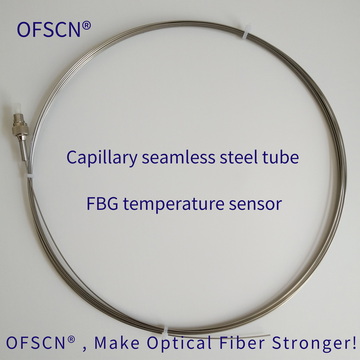Application of Fiber Bragg Grating Sensing Technology - Application of FBG Sensor - Application of FBG-Application of FBG Demodulator - Application of FBG Sensing in Industry
FBG Sensing Technology for the Temperature Monitoring of Food Cold Chain Transportation
The food industry is one of the most important industries in the world, and the quality and safety of food products are crucial for public health. The cold chain transportation of food products is an essential step in the food industry. Temperature control is vital in ensuring the quality and safety of food during transportation, as temperature fluctuations can lead to bacterial growth and food spoilage. In recent years, fiber grating sensing technology has emerged as a reliable and effective method for temperature monitoring in the food cold chain transportation process. In this article, we will discuss the problems that fiber grating sensing technology can solve, and how Beijing Dacheng Yongsheng Technology Co., Ltd.(short for DCYS ) can help to monitor the temperature of food cold chain transportation in the food industry.
Fiber Bragg Grating Sensing Principle:
Fiber Bragg gratings (FBGs) are periodic structures that are inscribed in the core of an optical fiber. These structures reflect a specific wavelength of light that is determined by the periodicity of the grating. When the grating is subjected to mechanical or thermal strain, the reflected wavelength changes in a predictable manner. By monitoring the reflected wavelength, changes in strain, temperature, and other parameters can be detected. FBG sensors can be used to monitor a wide range of parameters, including strain, stress, temperature, and vibration.
Click the link below for more details:
Demand Analysis for Temperature Monitoring in the Food Cold Chain Transportation Process:
Temperature monitoring is essential in the food cold chain transportation process. Food products must be transported within specific temperature ranges to prevent spoilage, maintain freshness, and ensure food safety. Temperature fluctuations during transportation can cause irreversible damage to food products, leading to economic losses for the food industry.

Why Temperature Monitoring of the Food Cold Chain Transportation Process is Needed:
Temperature monitoring is crucial in ensuring the quality and safety of food products during transportation. The growth of microorganisms, such as bacteria, is temperature-dependent. Temperature fluctuations during transportation can lead to bacterial growth and spoilage of food products. Therefore, temperature monitoring is necessary to prevent food spoilage, maintain food quality, and ensure food safety.

Difficulties in Temperature Monitoring of Food Cold Chain Transportation:
Temperature monitoring in the food cold chain transportation process is challenging due to several factors. The transportation process involves various modes of transportation, such as air, sea, and land. Each mode of transportation has its temperature control requirements, making it difficult to maintain a consistent temperature throughout the transportation process. Furthermore, temperature sensors used in the transportation process must be reliable, accurate, and rugged enough to withstand harsh transportation environments.
What Problems can be Solved by FBG Technology:
Fiber grating sensing technology has emerged as a reliable and effective method for temperature monitoring in the food cold chain transportation process. FBG sensors are small, rugged, and accurate, making them suitable for harsh transportation environments. Furthermore, FBG sensors can be easily integrated into the food packaging or attached to the surface of the food products, allowing for real-time temperature monitoring during transportation. With fiber grating sensing technology, food companies can ensure the quality and safety of their products during transportation, reduce economic losses due to spoilage, and increase customer satisfaction.
Recommended fiber grating temperature sensors:
Beijing Dacheng Yongsheng Technology Co., Ltd.:
Beijing Dacheng Yongsheng Technology Co., Ltd.(short for DCYS) is a professional manufacturer of fiber grating sensors, fiber grating demodulators and system software. Specializing in the production of various fiber grating sensors, including temperature, strain, stress, displacement, vibration, shape sensors, etc. DCYS also produces fiber grating demodulators, and can customize and develop related application software.
Recommended fiber grating demodulator:
Product Alias: Fiber Bragg Grating Interrogator, FBG Interrogator, FBG Sensor Interrogator, Fiber Optic Grating Interrogator, Fiber Bragg Grating Demodulator, FBG Demodulator, Fiber Optic Grating Demodulator
This product is produced by DCYS, and it is a high-speed high-frequency fiber Bragg grating demodulator(Interrogator). The fiber grating demodulator is compatible with various specifications and models of OFSCN® fiber bragg grating sensors (temperature, strain, stress FBG sensors, etc.). It features adjustable port density (4, 8, 16 channels) and high-speed high-refresh rate capabilities.
DCYS Helps to Monitor the Temperature of Food Cold Chain Transportation:
DCYS is a professional manufacturer of fiber grating temperature sensors, fiber grating demodulators, and related application software. DCYS has extensive experience in providing temperature monitoring solutions for the food industry's cold chain transportation process. DCYS‘s FBG sensors are rugged, accurate, and suitable for harsh transportation environments, making them ideal for temperature monitoring during the transportation process. Furthermore, DCYS provides customized solutions to meet the specific temperature monitoring requirements of clients.

Other Points Need to Be Clarified:
In conclusion, temperature monitoring is a critical aspect of ensuring food safety and quality throughout the food production and transportation process. The use of fiber grating sensing technology has revolutionized temperature monitoring in the food industry, providing accurate and reliable measurements even in harsh environments. With its ability to withstand extreme temperatures and harsh conditions, fiber grating sensing technology has become an essential tool in the food industry's efforts to maintain the integrity of the cold chain and ensure food safety. As a leading manufacturer of fiber grating temperature sensors and demodulators, Beijing Dacheng Yongsheng Technology Co., Ltd. is at the forefront of this technology, providing innovative solutions to the food industry's temperature monitoring needs. By working together with industry partners, DCYS can continue to advance fiber grating sensing technology and improve the safety and quality of food supply.
